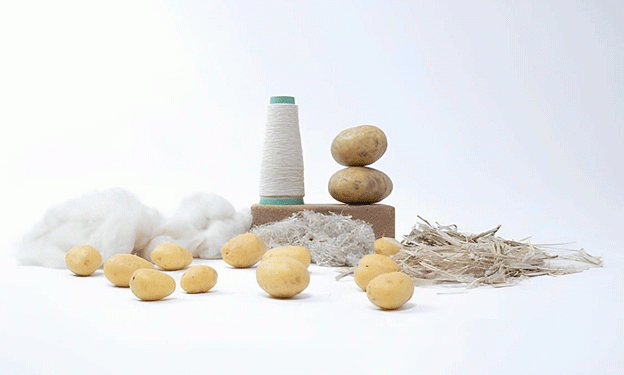Sustainability is no longer just a trend in the fashion industry—it’s a necessity. Fibe, a material science company based in London, is leading the charge with an innovative solution that addresses both fashion’s environmental impact and agricultural waste management. Their invention? A textile fibre created from the waste of potato harvests, offering a promising future for natural fibres and a potential game-changer for the apparel industry.
The Problem of Agricultural Waste
Each year, approximately 150 million tonnes of potato waste—mainly stems and leaves—are left to rot or are incinerated. This organic material is unsuitable for livestock feed or fertilizer, leading to a massive waste of resources. With no economic value, this waste represents a lost opportunity for farmers and a challenge for environmental sustainability. Fibe, however, has turned this problem into an opportunity.
Fibe’s Technological Breakthrough
Using a patent-pending biological process, Fibe extracts fibres from potato crop waste, creating a material that rivals conventional fibres like cotton and polyester. These fibres are not only soft and durable but are also produced with minimal environmental impact. According to the company, their process uses 99.7% less water, generates 82% fewer carbon emissions, and requires no additional land compared to cotton production. This makes Fibe’s fibres an incredibly resource-efficient alternative in an industry that desperately needs sustainable options.
In recent developments, Fibe successfully produced the world’s first yarn made entirely from potato waste. This milestone proves that their fibres are suitable for mass production using existing textile machinery, marking a significant step towards commercialisation.
Impact on Farmers and Sustainability
Fibe’s innovation has the potential to transform the potato farming industry. By providing farmers with an additional revenue stream from their waste, Fibe could make potato farming more profitable while encouraging sustainable agricultural practices. This win-win solution enhances the economic value of crops and promotes environmental stewardship, two critical issues facing modern agriculture.
Furthermore, Fibe’s approach supports a transparent supply chain, enabling brands to trace each fibre back to the farm where it was harvested. This level of traceability is becoming increasingly important to consumers who are concerned about the environmental and ethical impacts of their clothing.
Investment and Industry Support
Fibe’s vision has captured the attention of the investment community, with the company successfully closing a £1M pre-seed investment round. Patagonia’s corporate venture arm, Tin Shed Ventures, led the funding, joined by other investors who see the potential for Fibe’s fibres to disrupt the apparel industry. These funds will help Fibe scale its technology and bring its sustainable fibres to market, further driving the industry’s climate transition.
Fibe’s innovation represents a significant leap forward in both sustainable fashion and agricultural practices. By turning potato waste into valuable textile fibres, they address two pressing global challenges: reducing fashion’s environmental impact and making agriculture more sustainable and profitable. As they continue to scale their technology and build partnerships within the fashion industry, Fibe is poised to become a key player in the future of sustainable textiles.







